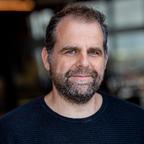In Austria, the FPÖ is well ahead in opinion polls and hopes to win the parliamentary elections in the fall. Under her boss Kickl, she has moved to the right again and is increasingly taking on the positions of the “Identitarian Movement”.
The so-called “Castell Aurora” is located in the village of Steyregg near Linz. It is a house with a blue-grey facade, a pub on the ground floor and floor-to-ceiling windows. In an information box next to the entrance, a lecture by Götz Kubitschek, the pioneer of the so-called “New Right” and one of the founders of the Institute for State Policy in Schnellroda (Saxony-Anhalt), which is classified as right-wing extremist, is advertised.
In Steyregg, the ideas and concepts of the “Identitarian Movement” are being brought to the people, says Uwe Sailer, a retired detective who is committed to combating right-wing extremism in Upper Austria. It is a “mixing of right-wing extremist ideas from AfD politicians, FPÖ politicians and fraternities” with a “catchment area” from Switzerland via Germany, Austria to Hungary
Intensive cooperation between younger activists
Sailer is not alone in this assessment. In Austria, a merging of the “Identitarian Movement” and the FPÖ party has been observed, especially since the corona pandemic, say experts.
According to Viennese right-wing extremism researcher Bernhard Weidinger, the cooperation is particularly intensive at the level of the FPÖ youth organization – “which now really looks, acts and speaks like the ‘Identitarians’.” Apart from formalities regarding the form of organization, he is no longer in a position to name any further differences.
Jobs as employees of factions
The right-wing extremist ideas from the “Identitarian Movement” find their way into the parties, but not only through events like the one in Steyregg, Austria. In both Austria and Germany, the FPÖ and AfD respectively employ employees who come from the “Identitarian Movement”.
With the AfD, for example, this can be observed in the Brandenburg state parliament, says right-wing extremism researcher at the Moses Mendelssohn Center at the University of Potsdam, Christoph Schulze, and cites as an example an employee of the AfD faction there who was involved in a house project of the “Identitarians Movement” in Halle was “a central figure”.
The head of the Institute for State Policy, which “played a key role in spreading the remigration slogan and also the “identitarian movement” in Germany,” also works in the state parliament as a speaker for the AfD parliamentary group. The AfD’s current press spokesman in the state parliament, in turn, was a participant in the Potsdam meeting, where, among other things, so-called remigration from Germany was discussed.
Division of labor Proceed
The Viennese political scientist Bernhard Weidinger observes that the party and activists increasingly see themselves as an overall movement that operates on a division of labor:
There is the parliamentary party, there is activism, there is the so-called alternative media – but with the awareness that we are working towards a common goal. And then the first rule is that the minimum that you can expect from each other is not to distance yourself from each other.
The main thing is against it
This has been the case with the Austrian FPÖ at least since Herbert Kickl was elected party leader in 2021 after a dispute over the direction of the party. Under him, the FPÖ adopted “identitarian positions”. Political scientist Natascha Strobl observes that this no longer deters voters.
There is a process among potential FPÖ and AfD voters that “incites people so much, so disrupts them, that it increasingly just doesn’t matter. That you can increasingly say, ‘Yes, we’re just Nazis, we’re just right-wing extremists’. And Whether that’s meant or taken ironically or not – just the fact that you go into this gray area says so much, because it’s no longer a deterrent. Because the ‘against’ is so much more important than anything else.”
Silke Hahne, ARD Vienna, tagesschau, February 23, 2024 10:46 a.m


